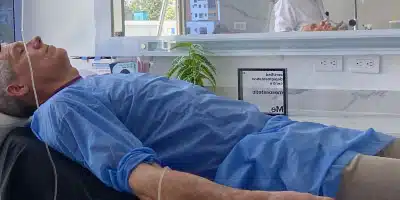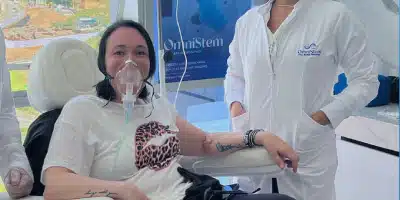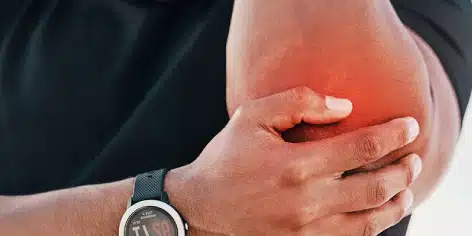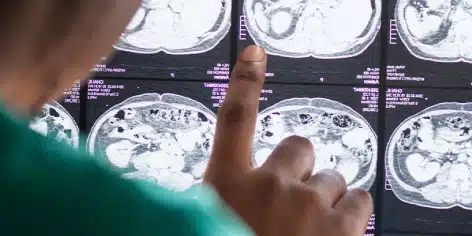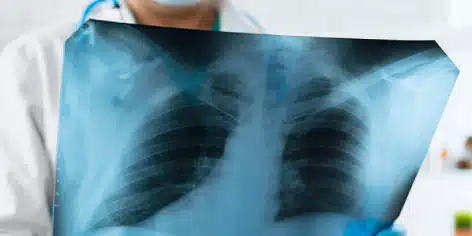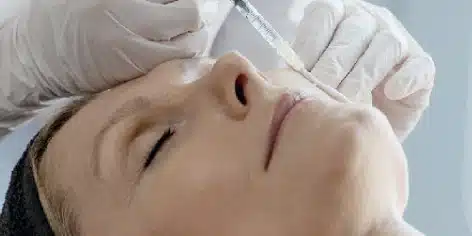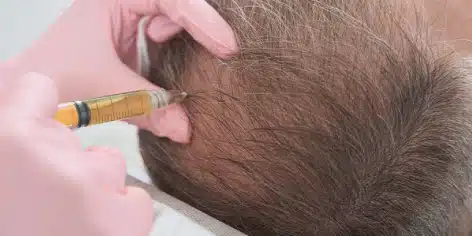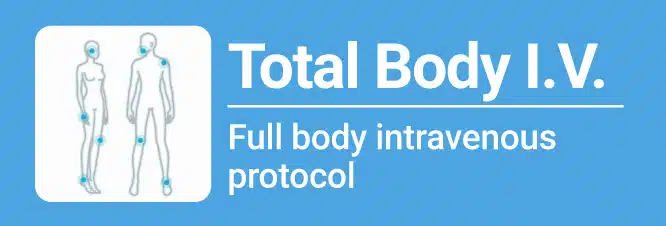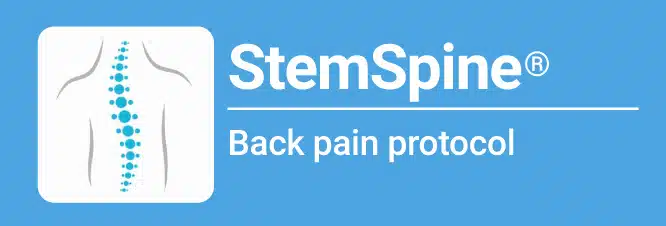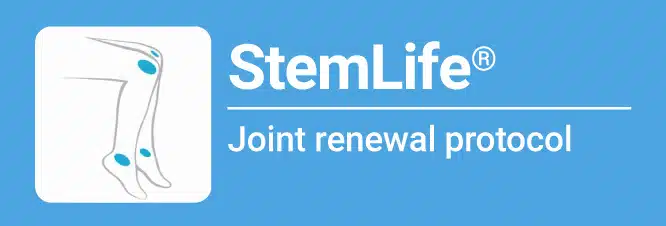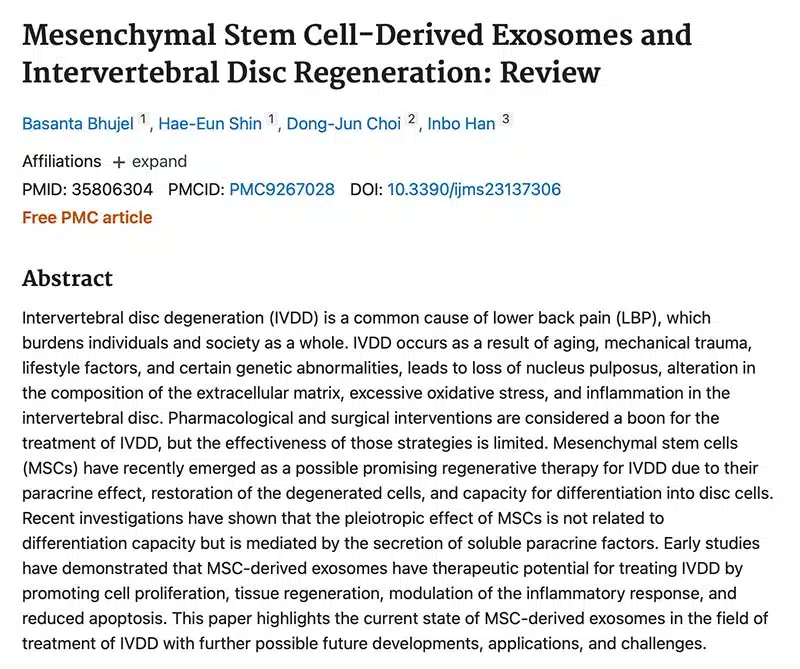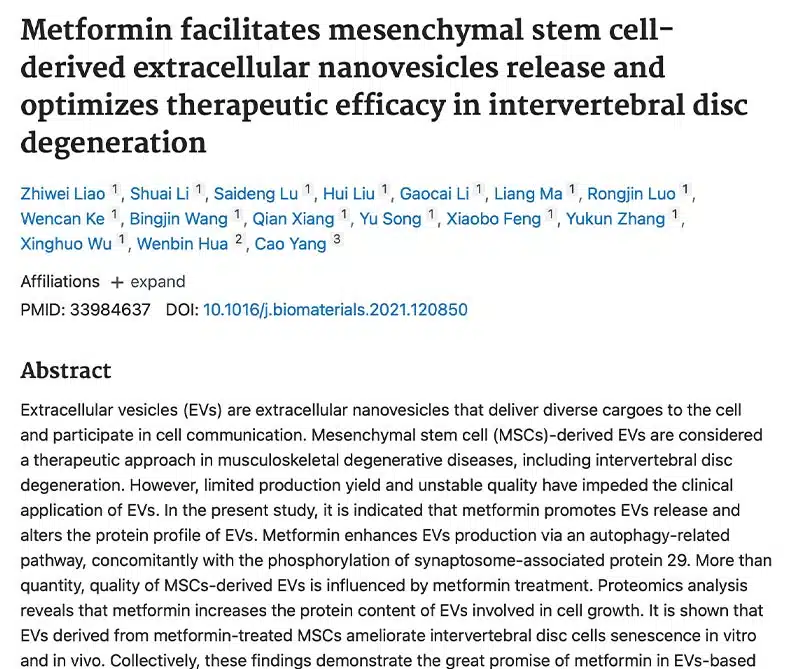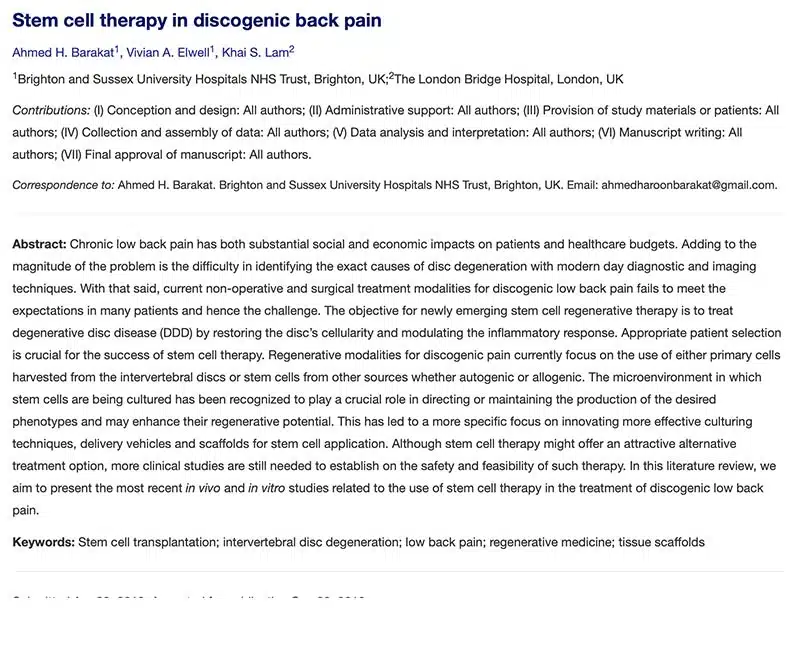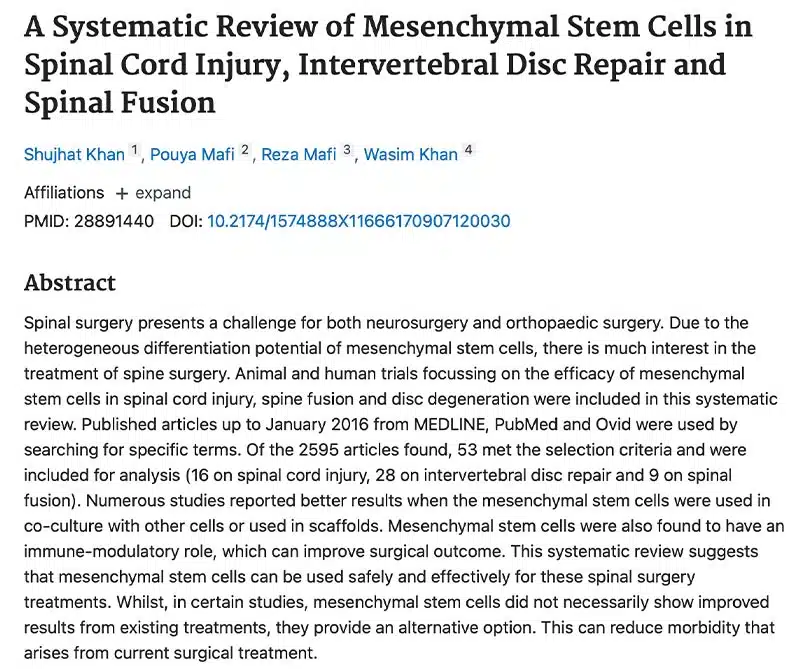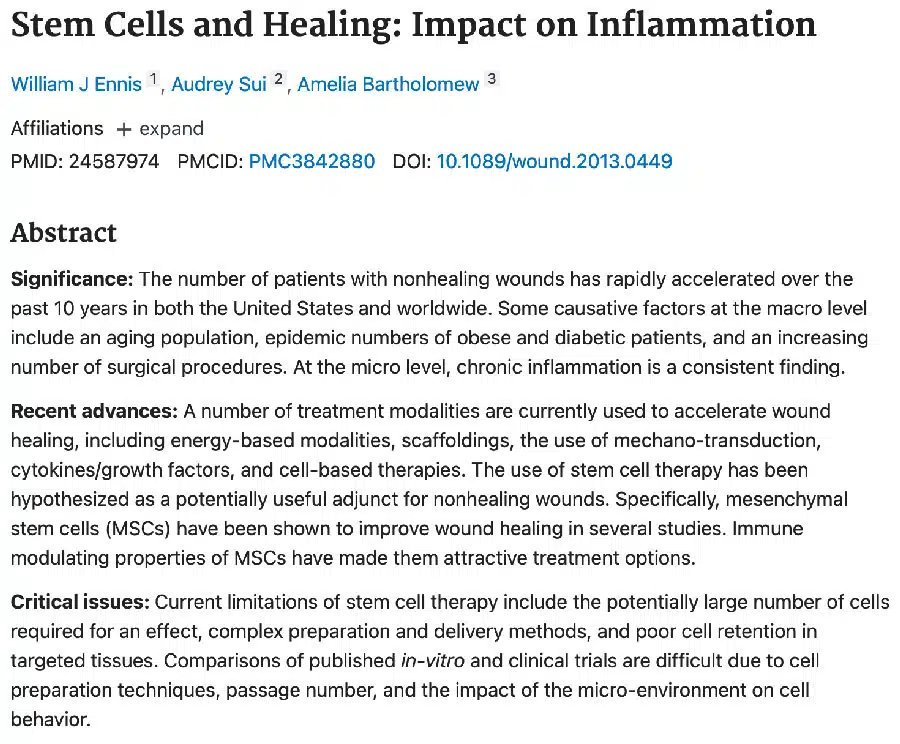- RESOURCE CENTER
Scientific Resources on Stem Cell Therapies
Explore Our Regenerative Medicine library
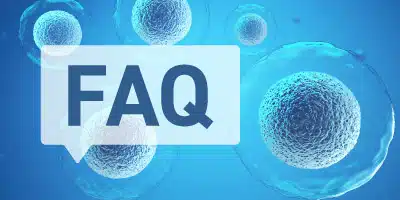
F.A.Q.
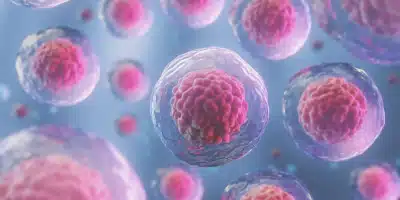
What Are Stem Cells?
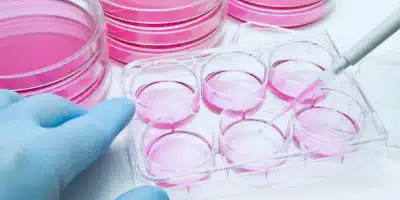
Types of Stem Cells
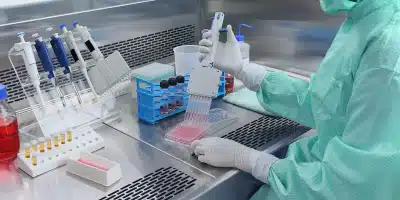
Source of Our Stem Cells
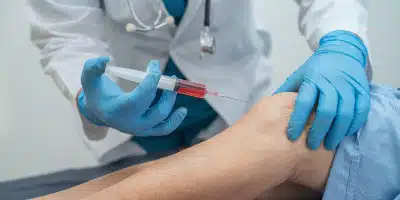
Conditions Treated
Third-Party Publications
Is This Treatment Available in the U.S.?
Patient Testimonials
- CONDITIONS
Conditions treated with Regenerative Medicine
Regenerative medicine plays a critical role in modulating inflammation and immune responses, offering therapeutic potential for a variety of health conditions.
- PROTOCOLS
Our Signature Protocols
Tailored stem cell therapies, meticulously designed to target specific conditions.
- WELLNESS RETREATS
- TESTIMONIALS
- ABOUT
StemLife® Spine Protocol
Understanding back pain and the potential of regenerative medicine
Spine conditions such as the degeneration of the intervertebral discs compromise their ability to cushion and support the spinal column, leading to discomfort and limited mobility.
Umbilical Cord-derived Mesenchymal Stem Cell Therapies
U-MSC are currently the most potent biologic available in the field of regenerative medicine.
This type of stem cell has the potential to treat a wide range of medical conditions, including autoimmune diseases, neurological disorders, and chronic pain, by replacing, repairing, and regenerating damaged or diseased cells in the body.
The Medical Impact of Spine Conditions
Spine conditions, back pain, and joint pain encompass a wide array of medical ailments, ranging from mild and temporary discomfort to chronic, debilitating pain. The impact of these conditions is multifaceted, affecting not only the physical well-being of individuals but also their psychological health, daily function, and quality of life.
Mobility and Flexibility: Conditions like osteoarthritis, rheumatoid arthritis, and degenerative disc disease can drastically reduce an individual’s range of motion. Reduced mobility can make everyday tasks, like bending or walking, increasingly difficult.
Chronic Pain: Chronic pain, especially in the back and joints, can be debilitating. This can lead to muscle atrophy due to inactivity, further exacerbating mobility issues.
Neurological Symptoms: Spinal conditions like herniated discs or spinal stenosis can compress nerves, leading to symptoms like numbness, tingling, or even paralysis in severe cases.
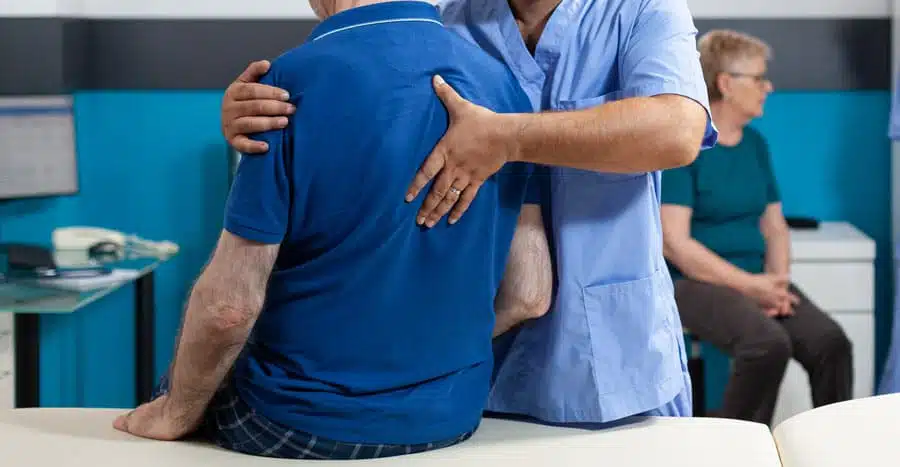
Advancements in regenerative medicine treatments for spine conditions
The forefront of regenerative therapies, including umbilical cord stem cells and U-MSC derived exosome treatments, offer a potential treatment for the management of spinal and back pain conditions.
These biological treatments aim to harness the body’s natural regenerative potential, offering an option for many who suffer from chronic pain.
U-MSC Stem Cells
Umbilical cord mesenchymal stem cells (U-MSC) are a type of stem cell located in the umbilical cord. These cells are multipotent, meaning they have the capability to differentiate into various cell types. Such a characteristic renders them extremely valuable for regenerative medicine.
U-MSC Derived Exosomes
U-MSC derived exosomes are nano particles released by U-MSC stem cells. These exosomes contain molecules that help cells communicate and heal. They are essential for sending signals to repair and reduce inflammation in damaged tissues and organs.
The umbilical mesenchymal stem cells (U-MSCs) and derived exosomes, treatment provides a comprehensive approach aimed at addressing the underlying causes of spinal discomfort and dysfunction.
Tissue Regeneration
In the circulatory system, umbilical mesenchymal stem cells (U-MSCs) operate synergistically with U-MSC-derived exosomes that are targeted to areas of spinal damage, such as degenerated discs. This integrative approach facilitates a regenerative effect; the stem cells possess the capacity to differentiate into the requisite cell types for repair and tissue regeneration, while the exosomes discharge bioactive factors that further promote the regeneration process.
Reduce inflammation
Inflammation is a crucial contributor to pain. U-MSC derived exosomes secrete anti-inflammatory factors that help reduce pain and swelling. Exosomes can modulate the local environment, suppressing inflammatory reactions and potentially alleviating pain.
Pain Modulation
U-MSC stem cells and U-MSC derived exosomes have been shown to modulate pain through various mechanisms. This can be done by altering the inflammatory environment, promoting tissue repair, or interacting with pain pathways.
Enhancing the quality of life for patients with chronic medical conditions
By harnessing the body’s inherent regenerative capabilities through U-MSC stem cells and derived exosomes, this innovative approach offers a pathway to mitigate the physical limitations imposed by chronic conditions such us:
• Degenerative Disc Disease
• Rheumatoid Arthritis
• Herniated Disc
• Sciatica
• Spondylolisthesis
• Spinal Stenosis
• Ankylosing Spondylitis
• Fibromyalgia
• Bursitis
• Tendinitis
• Gout
• Osteoporosis
Are you experiencing chronic back pain?
If you meet this specific criteria as a patient, you might be eligible for stem cell therapy.
Dealing with spine damage from a systemic disease, such as Ankylosing Spondylitis or Rheumatoid Arthritis.
Experiencing early-stage damage and seeking to avoid or delay invasive surgical procedures.
Unsuitable candidates for invasive surgery but still in need of effective pain management.
Experiencing pain following a previous spine surgery and ineligible for further surgical procedures.
1.
Bhujel, Basanta; Shin, Hae-Eun; Choiand, Dong-Jun; Han, Inbo
Mesenchymal Stem Cell-Derived Exosomes and Intervertebral Disc Regeneration Review Journal Article
In: 2022.
@article{nokey,
title = {Mesenchymal Stem Cell-Derived Exosomes and Intervertebral Disc Regeneration Review},
author = {Basanta Bhujel and Hae-Eun Shin and Dong-Jun Choiand and Inbo Han},
url = {https://europepmc.org/article/MED/35806304},
year = {2022},
date = {2022-06-30},
urldate = {2022-06-30},
abstract = {Intervertebral disc degeneration (IVDD) is a common cause of lower back pain (LBP), which burdens individuals and society as a whole. IVDD occurs as a result of aging, mechanical trauma, lifestyle factors, and certain genetic abnormalities, leads to loss of nucleus pulposus, alteration in the composition of the extracellular matrix, excessive oxidative stress, and inflammation in the intervertebral disc. Pharmacological and surgical interventions are considered a boon for the treatment of IVDD, but the effectiveness of those strategies is limited. Mesenchymal stem cells (MSCs) have recently emerged as a possible promising regenerative therapy for IVDD due to their paracrine effect, restoration of the degenerated cells, and capacity for differentiation into disc cells. Recent investigations have shown that the pleiotropic effect of MSCs is not related to differentiation capacity but is mediated by the secretion of soluble paracrine factors. Early studies have demonstrated that MSC-derived exosomes have therapeutic potential for treating IVDD by promoting cell proliferation, tissue regeneration, modulation of the inflammatory response, and reduced apoptosis. This paper highlights the current state of MSC-derived exosomes in the field of treatment of IVDD with further possible future developments, applications, and challenges.
},
keywords = {},
pubstate = {published},
tppubtype = {article}
}
Intervertebral disc degeneration (IVDD) is a common cause of lower back pain (LBP), which burdens individuals and society as a whole. IVDD occurs as a result of aging, mechanical trauma, lifestyle factors, and certain genetic abnormalities, leads to loss of nucleus pulposus, alteration in the composition of the extracellular matrix, excessive oxidative stress, and inflammation in the intervertebral disc. Pharmacological and surgical interventions are considered a boon for the treatment of IVDD, but the effectiveness of those strategies is limited. Mesenchymal stem cells (MSCs) have recently emerged as a possible promising regenerative therapy for IVDD due to their paracrine effect, restoration of the degenerated cells, and capacity for differentiation into disc cells. Recent investigations have shown that the pleiotropic effect of MSCs is not related to differentiation capacity but is mediated by the secretion of soluble paracrine factors. Early studies have demonstrated that MSC-derived exosomes have therapeutic potential for treating IVDD by promoting cell proliferation, tissue regeneration, modulation of the inflammatory response, and reduced apoptosis. This paper highlights the current state of MSC-derived exosomes in the field of treatment of IVDD with further possible future developments, applications, and challenges.
2.
Liao, Zhiwei; Li, Shuai; Lu, Saideng; Liu, Hui
In: 2021.
@article{nokey,
title = {Metformin facilitates mesenchymal stem cell-derived extracellular nanovesicles release and optimizes therapeutic efficacy in intervertebral disc degeneration},
author = {Zhiwei Liao and Shuai Li and Saideng Lu and Hui Liu},
doi = {https://doi.org/10.1016/j.biomaterials.2021.120850},
year = {2021},
date = {2021-07-20},
urldate = {2021-07-20},
abstract = {Extracellular vesicles (EVs) are extracellular nanovesicles that deliver diverse cargoes to the cell and participate in cell communication. Mesenchymal stem cell (MSCs)-derived EVs are considered a therapeutic approach in musculoskeletal degenerative diseases, including intervertebral disc degeneration. However, limited production yield and unstable quality have impeded the clinical application of EVs. In the present study, it is indicated that metformin promotes EVs release and alters the protein profile of EVs. Metformin enhances EVs production via an autophagy-related pathway, concomitantly with the phosphorylation of synaptosome-associated protein 29. More than quantity, quality of MSCs-derived EVs is influenced by metformin treatment. Proteomics analysis reveals that metformin increases the protein content of EVs involved in cell growth. It is shown that EVs derived from metformin-treated MSCs ameliorate intervertebral disc cells senescence in vitro and in vivo. Collectively, these findings demonstrate the great promise of metformin in EVs-based intervertebral disc regeneration.},
keywords = {},
pubstate = {published},
tppubtype = {article}
}
Extracellular vesicles (EVs) are extracellular nanovesicles that deliver diverse cargoes to the cell and participate in cell communication. Mesenchymal stem cell (MSCs)-derived EVs are considered a therapeutic approach in musculoskeletal degenerative diseases, including intervertebral disc degeneration. However, limited production yield and unstable quality have impeded the clinical application of EVs. In the present study, it is indicated that metformin promotes EVs release and alters the protein profile of EVs. Metformin enhances EVs production via an autophagy-related pathway, concomitantly with the phosphorylation of synaptosome-associated protein 29. More than quantity, quality of MSCs-derived EVs is influenced by metformin treatment. Proteomics analysis reveals that metformin increases the protein content of EVs involved in cell growth. It is shown that EVs derived from metformin-treated MSCs ameliorate intervertebral disc cells senescence in vitro and in vivo. Collectively, these findings demonstrate the great promise of metformin in EVs-based intervertebral disc regeneration.
3.
Barakat, Ahmed H.; Elwell, Vivian A.; Lam, Khai S.
Stem cell therapy in discogenic back pain Journal Article
In: 2019.
@article{nokey,
title = {Stem cell therapy in discogenic back pain},
author = {Ahmed H. Barakat and Vivian A. Elwell and Khai S. Lam},
url = {https://doi.org/10.21037%2Fjss.2019.09.22},
year = {2019},
date = {2019-12-05},
urldate = {2019-12-05},
abstract = {Chronic low back pain has both substantial social and economic impacts on patients and healthcare budgets. Adding to the magnitude of the problem is the difficulty in identifying the exact causes of disc degeneration with modern day diagnostic and imaging techniques. With that said, current non-operative and surgical treatment modalities for discogenic low back pain fails to meet the expectations in many patients and hence the challenge. The objective for newly emerging stem cell regenerative therapy is to treat degenerative disc disease (DDD) by restoring the disc’s cellularity and modulating the inflammatory response. Appropriate patient selection is crucial for the success of stem cell therapy. Regenerative modalities for discogenic pain currently focus on the use of either primary cells harvested from the intervertebral discs or stem cells from other sources whether autogenic or allogenic. The microenvironment in which stem cells are being cultured has been recognized to play a crucial role in directing or maintaining the production of the desired phenotypes and may enhance their regenerative potential. This has led to a more specific focus on innovating more effective culturing techniques, delivery vehicles and scaffolds for stem cell application. Although stem cell therapy might offer an attractive alternative treatment option, more clinical studies are still needed to establish on the safety and feasibility of such therapy. In this literature review, we aim to present the most recent in vivo and in vitro studies related to the use of stem cell therapy in the treatment of discogenic low back pain.},
keywords = {},
pubstate = {published},
tppubtype = {article}
}
Chronic low back pain has both substantial social and economic impacts on patients and healthcare budgets. Adding to the magnitude of the problem is the difficulty in identifying the exact causes of disc degeneration with modern day diagnostic and imaging techniques. With that said, current non-operative and surgical treatment modalities for discogenic low back pain fails to meet the expectations in many patients and hence the challenge. The objective for newly emerging stem cell regenerative therapy is to treat degenerative disc disease (DDD) by restoring the disc’s cellularity and modulating the inflammatory response. Appropriate patient selection is crucial for the success of stem cell therapy. Regenerative modalities for discogenic pain currently focus on the use of either primary cells harvested from the intervertebral discs or stem cells from other sources whether autogenic or allogenic. The microenvironment in which stem cells are being cultured has been recognized to play a crucial role in directing or maintaining the production of the desired phenotypes and may enhance their regenerative potential. This has led to a more specific focus on innovating more effective culturing techniques, delivery vehicles and scaffolds for stem cell application. Although stem cell therapy might offer an attractive alternative treatment option, more clinical studies are still needed to establish on the safety and feasibility of such therapy. In this literature review, we aim to present the most recent in vivo and in vitro studies related to the use of stem cell therapy in the treatment of discogenic low back pain.
4.
Khan, Shujhat; Mafi, Pouya; Mafi, Reza; Khan, Wasim
A Systematic Review of Mesenchymal Stem Cells in Spinal Cord Injury, Intervertebral Disc Repair and Spinal Fusion Journal Article
In: 2018.
@article{nokey,
title = {A Systematic Review of Mesenchymal Stem Cells in Spinal Cord Injury, Intervertebral Disc Repair and Spinal Fusion},
author = {Shujhat Khan and Pouya Mafi and Reza Mafi and Wasim Khan},
url = {https://doi.org/10.2174/1574888x11666170907120030},
year = {2018},
date = {2018-05-01},
urldate = {2018-05-01},
abstract = {Spinal surgery presents a challenge for both neurosurgery and orthopaedic surgery. Due to the heterogeneous differentiation potential of mesenchymal stem cells, there is much interest in the treatment of spine surgery. Animal and human trials focussing on the efficacy of mesenchymal stem cells in spinal cord injury, spine fusion and disc degeneration were included in this systematic review. Published articles up to January 2016 from MEDLINE, PubMed and Ovid were used by searching for specific terms. Of the 2595 articles found, 53 met the selection criteria and were included for analysis (16 on spinal cord injury, 28 on intervertebral disc repair and 9 on spinal fusion). Numerous studies reported better results when the mesenchymal stem cells were used in co-culture with other cells or used in scaffolds. Mesenchymal stem cells were also found to have an immune-modulatory role, which can improve surgical outcome. This systematic review suggests that mesenchymal stem cells can be used safely and effectively for these spinal surgery treatments. Whilst, in certain studies, mesenchymal stem cells did not necessarily show improved results from existing treatments, they provide an alternative option. This can reduce morbidity that arises from current surgical treatment.},
keywords = {},
pubstate = {published},
tppubtype = {article}
}
Spinal surgery presents a challenge for both neurosurgery and orthopaedic surgery. Due to the heterogeneous differentiation potential of mesenchymal stem cells, there is much interest in the treatment of spine surgery. Animal and human trials focussing on the efficacy of mesenchymal stem cells in spinal cord injury, spine fusion and disc degeneration were included in this systematic review. Published articles up to January 2016 from MEDLINE, PubMed and Ovid were used by searching for specific terms. Of the 2595 articles found, 53 met the selection criteria and were included for analysis (16 on spinal cord injury, 28 on intervertebral disc repair and 9 on spinal fusion). Numerous studies reported better results when the mesenchymal stem cells were used in co-culture with other cells or used in scaffolds. Mesenchymal stem cells were also found to have an immune-modulatory role, which can improve surgical outcome. This systematic review suggests that mesenchymal stem cells can be used safely and effectively for these spinal surgery treatments. Whilst, in certain studies, mesenchymal stem cells did not necessarily show improved results from existing treatments, they provide an alternative option. This can reduce morbidity that arises from current surgical treatment.
5.
Ennis, William J.; Sui, Audrey; Bartholomew, Amelia
Stem Cells and Healing: Impact on Inflammation Journal Article
In: 2013.
@article{nokey,
title = {Stem Cells and Healing: Impact on Inflammation},
author = {William J. Ennis and Audrey Sui and Amelia Bartholomew},
url = {https://www.ncbi.nlm.nih.gov/pmc/articles/PMC3842880/},
year = {2013},
date = {2013-09-02},
abstract = {Significance
The number of patients with nonhealing wounds has rapidly accelerated over the past 10 years in both the United States and worldwide. Some causative factors at the macro level include an aging population, epidemic numbers of obese and diabetic patients, and an increasing number of surgical procedures. At the micro level, chronic inflammation is a consistent finding.
Recent Advances
A number of treatment modalities are currently used to accelerate wound healing, including energy-based modalities, scaffoldings, the use of mechano-transduction, cytokines/growth factors, and cell-based therapies. The use of stem cell therapy has been hypothesized as a potentially useful adjunct for nonhealing wounds. Specifically, mesenchymal stem cells (MSCs) have been shown to improve wound healing in several studies. Immune modulating properties of MSCs have made them attractive treatment options.},
keywords = {},
pubstate = {published},
tppubtype = {article}
}
Significance
The number of patients with nonhealing wounds has rapidly accelerated over the past 10 years in both the United States and worldwide. Some causative factors at the macro level include an aging population, epidemic numbers of obese and diabetic patients, and an increasing number of surgical procedures. At the micro level, chronic inflammation is a consistent finding.
Recent Advances
A number of treatment modalities are currently used to accelerate wound healing, including energy-based modalities, scaffoldings, the use of mechano-transduction, cytokines/growth factors, and cell-based therapies. The use of stem cell therapy has been hypothesized as a potentially useful adjunct for nonhealing wounds. Specifically, mesenchymal stem cells (MSCs) have been shown to improve wound healing in several studies. Immune modulating properties of MSCs have made them attractive treatment options.
The number of patients with nonhealing wounds has rapidly accelerated over the past 10 years in both the United States and worldwide. Some causative factors at the macro level include an aging population, epidemic numbers of obese and diabetic patients, and an increasing number of surgical procedures. At the micro level, chronic inflammation is a consistent finding.
Recent Advances
A number of treatment modalities are currently used to accelerate wound healing, including energy-based modalities, scaffoldings, the use of mechano-transduction, cytokines/growth factors, and cell-based therapies. The use of stem cell therapy has been hypothesized as a potentially useful adjunct for nonhealing wounds. Specifically, mesenchymal stem cells (MSCs) have been shown to improve wound healing in several studies. Immune modulating properties of MSCs have made them attractive treatment options.
6.
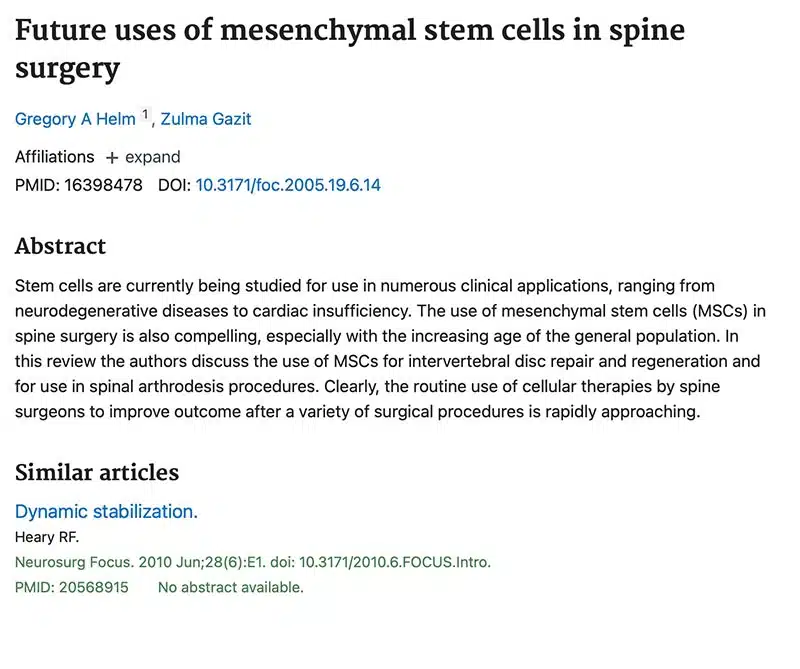
Helm, Gregory A; Gazit, Zulma
Future uses of mesenchymal stem cells in spine surgery Journal Article
In: 2005.
@article{nokey,
title = {Future uses of mesenchymal stem cells in spine surgery},
author = {Gregory A Helm and Zulma Gazit},
url = {https://doi.org/10.3171/foc.2005.19.6.14},
year = {2005},
date = {2005-12-05},
urldate = {2005-12-05},
abstract = {Stem cells are currently being studied for use in numerous clinical applications, ranging from neurodegenerative diseases to cardiac insufficiency. The use of mesenchymal stem cells (MSCs) in spine surgery is also compelling, especially with the increasing age of the general population. In this review the authors discuss the use of MSCs for intervertebral disc repair and regeneration and for use in spinal arthrodesis procedures. Clearly, the routine use of cellular therapies by spine surgeons to improve outcome after a variety of surgical procedures is rapidly approaching.},
keywords = {},
pubstate = {published},
tppubtype = {article}
}
Stem cells are currently being studied for use in numerous clinical applications, ranging from neurodegenerative diseases to cardiac insufficiency. The use of mesenchymal stem cells (MSCs) in spine surgery is also compelling, especially with the increasing age of the general population. In this review the authors discuss the use of MSCs for intervertebral disc repair and regeneration and for use in spinal arthrodesis procedures. Clearly, the routine use of cellular therapies by spine surgeons to improve outcome after a variety of surgical procedures is rapidly approaching.
1.
Bhujel, Basanta; Shin, Hae-Eun; Choiand, Dong-Jun; Han, Inbo
Mesenchymal Stem Cell-Derived Exosomes and Intervertebral Disc Regeneration Review Journal Article
In: 2022.
@article{nokey,
title = {Mesenchymal Stem Cell-Derived Exosomes and Intervertebral Disc Regeneration Review},
author = {Basanta Bhujel and Hae-Eun Shin and Dong-Jun Choiand and Inbo Han},
url = {https://europepmc.org/article/MED/35806304},
year = {2022},
date = {2022-06-30},
urldate = {2022-06-30},
abstract = {Intervertebral disc degeneration (IVDD) is a common cause of lower back pain (LBP), which burdens individuals and society as a whole. IVDD occurs as a result of aging, mechanical trauma, lifestyle factors, and certain genetic abnormalities, leads to loss of nucleus pulposus, alteration in the composition of the extracellular matrix, excessive oxidative stress, and inflammation in the intervertebral disc. Pharmacological and surgical interventions are considered a boon for the treatment of IVDD, but the effectiveness of those strategies is limited. Mesenchymal stem cells (MSCs) have recently emerged as a possible promising regenerative therapy for IVDD due to their paracrine effect, restoration of the degenerated cells, and capacity for differentiation into disc cells. Recent investigations have shown that the pleiotropic effect of MSCs is not related to differentiation capacity but is mediated by the secretion of soluble paracrine factors. Early studies have demonstrated that MSC-derived exosomes have therapeutic potential for treating IVDD by promoting cell proliferation, tissue regeneration, modulation of the inflammatory response, and reduced apoptosis. This paper highlights the current state of MSC-derived exosomes in the field of treatment of IVDD with further possible future developments, applications, and challenges.
},
keywords = {},
pubstate = {published},
tppubtype = {article}
}
Intervertebral disc degeneration (IVDD) is a common cause of lower back pain (LBP), which burdens individuals and society as a whole. IVDD occurs as a result of aging, mechanical trauma, lifestyle factors, and certain genetic abnormalities, leads to loss of nucleus pulposus, alteration in the composition of the extracellular matrix, excessive oxidative stress, and inflammation in the intervertebral disc. Pharmacological and surgical interventions are considered a boon for the treatment of IVDD, but the effectiveness of those strategies is limited. Mesenchymal stem cells (MSCs) have recently emerged as a possible promising regenerative therapy for IVDD due to their paracrine effect, restoration of the degenerated cells, and capacity for differentiation into disc cells. Recent investigations have shown that the pleiotropic effect of MSCs is not related to differentiation capacity but is mediated by the secretion of soluble paracrine factors. Early studies have demonstrated that MSC-derived exosomes have therapeutic potential for treating IVDD by promoting cell proliferation, tissue regeneration, modulation of the inflammatory response, and reduced apoptosis. This paper highlights the current state of MSC-derived exosomes in the field of treatment of IVDD with further possible future developments, applications, and challenges.
2.
Liao, Zhiwei; Li, Shuai; Lu, Saideng; Liu, Hui
In: 2021.
@article{nokey,
title = {Metformin facilitates mesenchymal stem cell-derived extracellular nanovesicles release and optimizes therapeutic efficacy in intervertebral disc degeneration},
author = {Zhiwei Liao and Shuai Li and Saideng Lu and Hui Liu},
doi = {https://doi.org/10.1016/j.biomaterials.2021.120850},
year = {2021},
date = {2021-07-20},
urldate = {2021-07-20},
abstract = {Extracellular vesicles (EVs) are extracellular nanovesicles that deliver diverse cargoes to the cell and participate in cell communication. Mesenchymal stem cell (MSCs)-derived EVs are considered a therapeutic approach in musculoskeletal degenerative diseases, including intervertebral disc degeneration. However, limited production yield and unstable quality have impeded the clinical application of EVs. In the present study, it is indicated that metformin promotes EVs release and alters the protein profile of EVs. Metformin enhances EVs production via an autophagy-related pathway, concomitantly with the phosphorylation of synaptosome-associated protein 29. More than quantity, quality of MSCs-derived EVs is influenced by metformin treatment. Proteomics analysis reveals that metformin increases the protein content of EVs involved in cell growth. It is shown that EVs derived from metformin-treated MSCs ameliorate intervertebral disc cells senescence in vitro and in vivo. Collectively, these findings demonstrate the great promise of metformin in EVs-based intervertebral disc regeneration.},
keywords = {},
pubstate = {published},
tppubtype = {article}
}
Extracellular vesicles (EVs) are extracellular nanovesicles that deliver diverse cargoes to the cell and participate in cell communication. Mesenchymal stem cell (MSCs)-derived EVs are considered a therapeutic approach in musculoskeletal degenerative diseases, including intervertebral disc degeneration. However, limited production yield and unstable quality have impeded the clinical application of EVs. In the present study, it is indicated that metformin promotes EVs release and alters the protein profile of EVs. Metformin enhances EVs production via an autophagy-related pathway, concomitantly with the phosphorylation of synaptosome-associated protein 29. More than quantity, quality of MSCs-derived EVs is influenced by metformin treatment. Proteomics analysis reveals that metformin increases the protein content of EVs involved in cell growth. It is shown that EVs derived from metformin-treated MSCs ameliorate intervertebral disc cells senescence in vitro and in vivo. Collectively, these findings demonstrate the great promise of metformin in EVs-based intervertebral disc regeneration.
3.
Barakat, Ahmed H.; Elwell, Vivian A.; Lam, Khai S.
Stem cell therapy in discogenic back pain Journal Article
In: 2019.
@article{nokey,
title = {Stem cell therapy in discogenic back pain},
author = {Ahmed H. Barakat and Vivian A. Elwell and Khai S. Lam},
url = {https://doi.org/10.21037%2Fjss.2019.09.22},
year = {2019},
date = {2019-12-05},
urldate = {2019-12-05},
abstract = {Chronic low back pain has both substantial social and economic impacts on patients and healthcare budgets. Adding to the magnitude of the problem is the difficulty in identifying the exact causes of disc degeneration with modern day diagnostic and imaging techniques. With that said, current non-operative and surgical treatment modalities for discogenic low back pain fails to meet the expectations in many patients and hence the challenge. The objective for newly emerging stem cell regenerative therapy is to treat degenerative disc disease (DDD) by restoring the disc’s cellularity and modulating the inflammatory response. Appropriate patient selection is crucial for the success of stem cell therapy. Regenerative modalities for discogenic pain currently focus on the use of either primary cells harvested from the intervertebral discs or stem cells from other sources whether autogenic or allogenic. The microenvironment in which stem cells are being cultured has been recognized to play a crucial role in directing or maintaining the production of the desired phenotypes and may enhance their regenerative potential. This has led to a more specific focus on innovating more effective culturing techniques, delivery vehicles and scaffolds for stem cell application. Although stem cell therapy might offer an attractive alternative treatment option, more clinical studies are still needed to establish on the safety and feasibility of such therapy. In this literature review, we aim to present the most recent in vivo and in vitro studies related to the use of stem cell therapy in the treatment of discogenic low back pain.},
keywords = {},
pubstate = {published},
tppubtype = {article}
}
Chronic low back pain has both substantial social and economic impacts on patients and healthcare budgets. Adding to the magnitude of the problem is the difficulty in identifying the exact causes of disc degeneration with modern day diagnostic and imaging techniques. With that said, current non-operative and surgical treatment modalities for discogenic low back pain fails to meet the expectations in many patients and hence the challenge. The objective for newly emerging stem cell regenerative therapy is to treat degenerative disc disease (DDD) by restoring the disc’s cellularity and modulating the inflammatory response. Appropriate patient selection is crucial for the success of stem cell therapy. Regenerative modalities for discogenic pain currently focus on the use of either primary cells harvested from the intervertebral discs or stem cells from other sources whether autogenic or allogenic. The microenvironment in which stem cells are being cultured has been recognized to play a crucial role in directing or maintaining the production of the desired phenotypes and may enhance their regenerative potential. This has led to a more specific focus on innovating more effective culturing techniques, delivery vehicles and scaffolds for stem cell application. Although stem cell therapy might offer an attractive alternative treatment option, more clinical studies are still needed to establish on the safety and feasibility of such therapy. In this literature review, we aim to present the most recent in vivo and in vitro studies related to the use of stem cell therapy in the treatment of discogenic low back pain.
4.
Khan, Shujhat; Mafi, Pouya; Mafi, Reza; Khan, Wasim
A Systematic Review of Mesenchymal Stem Cells in Spinal Cord Injury, Intervertebral Disc Repair and Spinal Fusion Journal Article
In: 2018.
@article{nokey,
title = {A Systematic Review of Mesenchymal Stem Cells in Spinal Cord Injury, Intervertebral Disc Repair and Spinal Fusion},
author = {Shujhat Khan and Pouya Mafi and Reza Mafi and Wasim Khan},
url = {https://doi.org/10.2174/1574888x11666170907120030},
year = {2018},
date = {2018-05-01},
urldate = {2018-05-01},
abstract = {Spinal surgery presents a challenge for both neurosurgery and orthopaedic surgery. Due to the heterogeneous differentiation potential of mesenchymal stem cells, there is much interest in the treatment of spine surgery. Animal and human trials focussing on the efficacy of mesenchymal stem cells in spinal cord injury, spine fusion and disc degeneration were included in this systematic review. Published articles up to January 2016 from MEDLINE, PubMed and Ovid were used by searching for specific terms. Of the 2595 articles found, 53 met the selection criteria and were included for analysis (16 on spinal cord injury, 28 on intervertebral disc repair and 9 on spinal fusion). Numerous studies reported better results when the mesenchymal stem cells were used in co-culture with other cells or used in scaffolds. Mesenchymal stem cells were also found to have an immune-modulatory role, which can improve surgical outcome. This systematic review suggests that mesenchymal stem cells can be used safely and effectively for these spinal surgery treatments. Whilst, in certain studies, mesenchymal stem cells did not necessarily show improved results from existing treatments, they provide an alternative option. This can reduce morbidity that arises from current surgical treatment.},
keywords = {},
pubstate = {published},
tppubtype = {article}
}
Spinal surgery presents a challenge for both neurosurgery and orthopaedic surgery. Due to the heterogeneous differentiation potential of mesenchymal stem cells, there is much interest in the treatment of spine surgery. Animal and human trials focussing on the efficacy of mesenchymal stem cells in spinal cord injury, spine fusion and disc degeneration were included in this systematic review. Published articles up to January 2016 from MEDLINE, PubMed and Ovid were used by searching for specific terms. Of the 2595 articles found, 53 met the selection criteria and were included for analysis (16 on spinal cord injury, 28 on intervertebral disc repair and 9 on spinal fusion). Numerous studies reported better results when the mesenchymal stem cells were used in co-culture with other cells or used in scaffolds. Mesenchymal stem cells were also found to have an immune-modulatory role, which can improve surgical outcome. This systematic review suggests that mesenchymal stem cells can be used safely and effectively for these spinal surgery treatments. Whilst, in certain studies, mesenchymal stem cells did not necessarily show improved results from existing treatments, they provide an alternative option. This can reduce morbidity that arises from current surgical treatment.
5.
Ennis, William J.; Sui, Audrey; Bartholomew, Amelia
Stem Cells and Healing: Impact on Inflammation Journal Article
In: 2013.
@article{nokey,
title = {Stem Cells and Healing: Impact on Inflammation},
author = {William J. Ennis and Audrey Sui and Amelia Bartholomew},
url = {https://www.ncbi.nlm.nih.gov/pmc/articles/PMC3842880/},
year = {2013},
date = {2013-09-02},
abstract = {Significance
The number of patients with nonhealing wounds has rapidly accelerated over the past 10 years in both the United States and worldwide. Some causative factors at the macro level include an aging population, epidemic numbers of obese and diabetic patients, and an increasing number of surgical procedures. At the micro level, chronic inflammation is a consistent finding.
Recent Advances
A number of treatment modalities are currently used to accelerate wound healing, including energy-based modalities, scaffoldings, the use of mechano-transduction, cytokines/growth factors, and cell-based therapies. The use of stem cell therapy has been hypothesized as a potentially useful adjunct for nonhealing wounds. Specifically, mesenchymal stem cells (MSCs) have been shown to improve wound healing in several studies. Immune modulating properties of MSCs have made them attractive treatment options.},
keywords = {},
pubstate = {published},
tppubtype = {article}
}
Significance
The number of patients with nonhealing wounds has rapidly accelerated over the past 10 years in both the United States and worldwide. Some causative factors at the macro level include an aging population, epidemic numbers of obese and diabetic patients, and an increasing number of surgical procedures. At the micro level, chronic inflammation is a consistent finding.
Recent Advances
A number of treatment modalities are currently used to accelerate wound healing, including energy-based modalities, scaffoldings, the use of mechano-transduction, cytokines/growth factors, and cell-based therapies. The use of stem cell therapy has been hypothesized as a potentially useful adjunct for nonhealing wounds. Specifically, mesenchymal stem cells (MSCs) have been shown to improve wound healing in several studies. Immune modulating properties of MSCs have made them attractive treatment options.
The number of patients with nonhealing wounds has rapidly accelerated over the past 10 years in both the United States and worldwide. Some causative factors at the macro level include an aging population, epidemic numbers of obese and diabetic patients, and an increasing number of surgical procedures. At the micro level, chronic inflammation is a consistent finding.
Recent Advances
A number of treatment modalities are currently used to accelerate wound healing, including energy-based modalities, scaffoldings, the use of mechano-transduction, cytokines/growth factors, and cell-based therapies. The use of stem cell therapy has been hypothesized as a potentially useful adjunct for nonhealing wounds. Specifically, mesenchymal stem cells (MSCs) have been shown to improve wound healing in several studies. Immune modulating properties of MSCs have made them attractive treatment options.
6.

Helm, Gregory A; Gazit, Zulma
Future uses of mesenchymal stem cells in spine surgery Journal Article
In: 2005.
@article{nokey,
title = {Future uses of mesenchymal stem cells in spine surgery},
author = {Gregory A Helm and Zulma Gazit},
url = {https://doi.org/10.3171/foc.2005.19.6.14},
year = {2005},
date = {2005-12-05},
urldate = {2005-12-05},
abstract = {Stem cells are currently being studied for use in numerous clinical applications, ranging from neurodegenerative diseases to cardiac insufficiency. The use of mesenchymal stem cells (MSCs) in spine surgery is also compelling, especially with the increasing age of the general population. In this review the authors discuss the use of MSCs for intervertebral disc repair and regeneration and for use in spinal arthrodesis procedures. Clearly, the routine use of cellular therapies by spine surgeons to improve outcome after a variety of surgical procedures is rapidly approaching.},
keywords = {},
pubstate = {published},
tppubtype = {article}
}
Stem cells are currently being studied for use in numerous clinical applications, ranging from neurodegenerative diseases to cardiac insufficiency. The use of mesenchymal stem cells (MSCs) in spine surgery is also compelling, especially with the increasing age of the general population. In this review the authors discuss the use of MSCs for intervertebral disc repair and regeneration and for use in spinal arthrodesis procedures. Clearly, the routine use of cellular therapies by spine surgeons to improve outcome after a variety of surgical procedures is rapidly approaching.
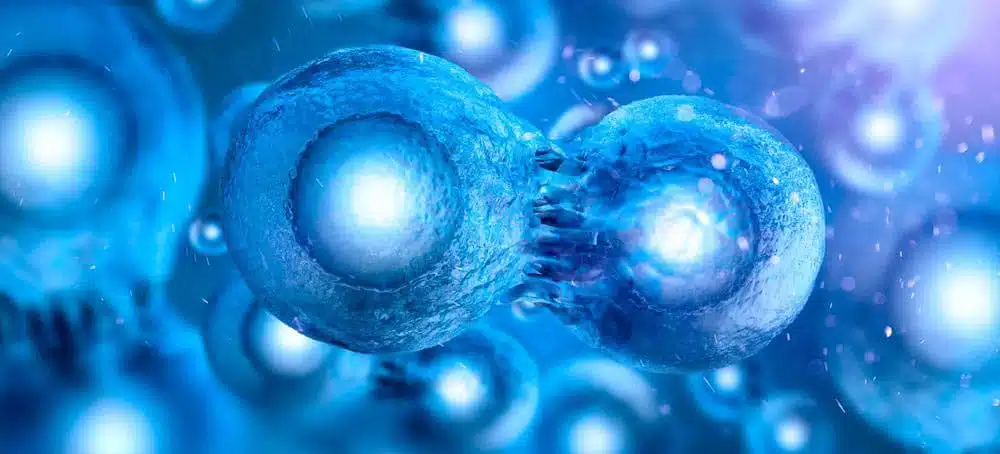
Safe and effective non invasive treatment
An additional benefit for patients is that umbilical-derived stem cell treatment does not require invasive surgery or significant downtime.
U-MSC stem cells and exosomes are prepared within a certified cell laboratory and are third-party tested. They are administered intravenously and directly into the spinal treatment areas by our experienced medical team.
Fill out the form to contact our medical team
Complete the form to speak with our patient advocates and learn more about Omni-Stem Cell treatments.

DISCOVER REGENERATIVE MEDICINE
U-MSC stem cells can improve overall spine wellness and alleviate inflammation chronic pain.

Visit our resource center for a comprehensive collection of resources, studies, and recent advancements in Regenerative Medicine.
Stem cell treatments are currently deemed experimental and have not yet received FDA approval. As a result, such treatments are not permitted in the U.S. While this doesn’t imply that these treatments are ineffective, it does indicate that there’s limited scientific evidence supporting their use.
Umbilical Cord-derived Mesenchymal Stem Cell Therapies
U-MSC is currently the most potent biologic available in regenerative medicine. This type of stem cell can treat a wide range of medical conditions, including autoimmune diseases, neurological disorders, and chronic pain, by replacing, repairing, and regenerating damaged or diseased cells in the body.


